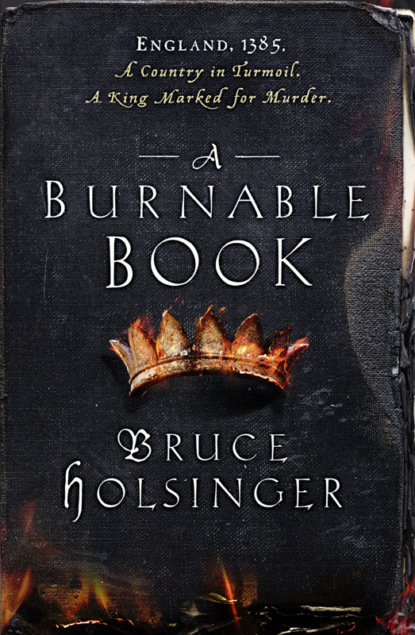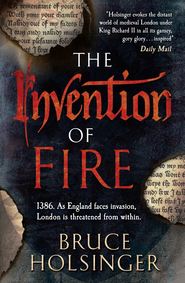По всем вопросам обращайтесь на: info@litportal.ru
(©) 2003-2024.
✖
A Burnable Book
Автор
Год написания книги
2019
Настройки чтения
Размер шрифта
Высота строк
Поля
‘More time, sir? In here?’ He shook his head. ‘They’ll send me down, sir, down to the Bocardo. They press them down there, it’s said. Sticks them with nails like Jesu himself, do abominations each to the other. Don’t want the Bocardo, Master Gower, not by the blood.’
My hands settled on Blythe’s mangled fingers, stilling them against the wood. Mutilated, cracked, darkened with years of stonework, these fingers had shaped their share of useful beauty over the years: a lintel, a buttress, the pearled spans of a bishop’s palace, the mortaring so precise you would never know from beyond a few feet that what you saw was not a single stone. ‘Mark, I will do what I can to—’
‘Have an end!’
I flinched at the yawn of old hinges and half-turned to the door. Tom Tugg, keeper of Newgate, a cock in the yard. He swung a ring of keys, each a gnarled foot of iron. ‘Fees to be tallied and collected presently,’ he crooned, and two turnkeys did their work. Blythe moaned, the irons biting his swollen wrists.
It took a moment, but finally Tugg saw my face. Even in the scant light of three candles I caught his gape.
‘Whatsit – who let this fiend speak to my prisoner?’ He spun on his men. ‘Who put them in here?’
Your deputy. A small threat for a small thing. The turnkeys just shrugged.
‘Take him back,’ Tugg ordered, a spit of disgust. He looked at me, and got my heartiest smile. He licked his lips. ‘Come along, then.’
I gave Blythe’s broad back a pat before he was pulled in the opposite direction. Tugg led me along the passage to the outer gatehouse. A fight had broken out in the women’s chamber, a crowd cheering the crunch of bone on the stone floor. At the gatehouse door Tugg turned on me. ‘Well?’ His chin was pocked, unshaved.
‘I would like Blythe transferred to Ludgate until delivery.’
Tugg wrinkled his heavy brow. ‘Ludgate, you say?’ The new prison, recently completed at the western gate and now under the custody of the city chamber, housed those accused only of civil offences. So pleasant were its conditions that stories were circulating of inmates striking deals to remain jailed. ‘You’ve got to understand my situation here, Gower,’ he said with a slight twinge of his jaw. ‘Newgate’s abrim with spies.’
‘So I’ve heard,’ I said, prepared for this. ‘Secret alliances with the Scots, French agents lurking behind every door.’
‘Twenty of them at last count, held without surety.’
‘All the more reason to move Mark Blythe, then, for he’s no spy,’ I said. ‘Relieve the overcrowding, put a petty criminal out of your mind.’ Almost there. ‘You can say it was your idea, sound leader that you are.’
He blew out a breath. ‘A pound, Gower. It’ll take a pound to move him, what with that touchy keeper they got, dealings with the Guildhall—’
‘Wonderful,’ I said. ‘We’ll deduct it from your balance.’ Tugg was still down to me many pounds; another handful of shillings would make little difference.
‘See here, Gower—’
‘Nothing to see, Tugg. I have your debt, I have your note. And I have the most horrendous bit of—’
‘Ludgate, then,’ he said, with another thick sigh. ‘He’ll be there till delivery.’
I gave him a hard look. ‘Live delivery.’ He nodded.
Outside Newgate I retrieved my pattens, then trudged through the walls and up the muddy way to Holbourne, breathing shallowly on the bridge as I neared the outer reaches of the ward. Before the churchyard at St Andrew a wild-haired man preached to the drizzle, his only parishioners a crescent of nosing goats. I caught a snatch of verse as I ducked into the narrow alley just east of Thavie’s Inn.
‘Full long shall he lead us, full rich shall he rule,
Through pain of pestilence, through wounds of long war.
Yet morire is matter all sovereigns must suffer.’
All kings must die. True enough, and the lines were well wrought, though the preacher soon lapsed into the usual fare. Corruption, gluttony, lust, the coming holocaust of the unfaithful. I wondered how long the poor man would last before joining Blythe in his cell.
At street level Monksblood’s stood open to the weather, a brick wedged beneath the alley door. I leaned in and gave a nod to the keeper. He tossed me a jar. At the foot of the stairs sat his daughter, a slight thing of about eight. With her foot resting on the next cask, she angled my jar beneath the tap and carefully turned the bronze spigot. I dropped a few pennies in her little palm. A wan smile, tired eyes bright for a moment beneath her shining brow, then she looked past me and up the stairs, waiting for her father’s next fish.
With the sour ale on my tongue I surveyed the undercroft tavern, lit weakly by a row of lanterns dangling from heavy beams. The tables were nearly empty, just two groups of men clustered along the hearth. Masons, fresh from work on the bridge. I got a few sullen looks. Steam rising from damp clothes, the muffled clatter of boots overhead.
In the far corner my friend sat alone, frowning into his jar as his finger traced a slow arc around its mouth. He seemed coiled on the bench, his brow knit, his eyes narrowed in concentration, the whole of him tensed against some unspoken thought.
‘Geoffrey,’ I said, and moved forward.
Half-turning with a start, he rose, his face blossoming into a smile. ‘Mon ami.’ He spread his hands.
As my arms wrapped his frame I felt the familiar surge of anticipation: for court gossip, for poetic banter, for news of mutual acquaintances. Yet beneath the thin coat I also felt ribs, hard against tightened skin. Chaucer had lost a couple of stone that winter; there was less to him since his latest return from abroad, and his unfashionable surcoat, of undyed wool cut simply with straight sleeves, lent an almost rural aspect to his bearing. Normally he would dress like a bit of a fop. I wondered what explained the change.
For a while we just drank, saying nothing, two hounds sniffing around after a long separation. Eventually he leaned over the board. ‘How has it been, John? You know …’
I looked away. ‘Let’s not bleed that wound, Geoffrey.’
He let that hang, then touched my elbow. ‘I hope it has started to heal, at least.’
‘I had her things removed and sold at Candlemas – most of them.’ Candlemas: purification, purging, the scouring of the soul and the larder. I thought, as I hadn’t in weeks, of Sarah’s prayerbook, its margins and flyleaves full of her jottings. It was one of the few of her possessions I had kept.
Chaucer moved his hand away. I asked about Philippa. He picked a splinter from the table. ‘Keeps to court, hovering around her sister and the Infanta. It doesn’t help that I’m travelling all the time. Calais, the cinque ports.’
‘And this recent trip, to Tuscany and Milan? The custom was able to spare you?’ Back in November Chaucer had arranged for a deputy to step in for him at the customhouse. His trip south had been planned hastily, and for reasons he had kept to himself.
‘Some negotiations for the chancellor: a bribe here, a false promise there.’ He pushed a lump of talgar across the table. The Welsh cheese was an epiphany on my tongue: tart, rich, deliciously illegal. ‘Though this trip was a bit less official than the last. Inglese italianizzato, diavolo incarnato.’ He feigned a sinister smile.
An Englishman italianized is the devil incarnate. ‘A judgment you inspired, I suppose?’
‘You’ve been practising!’
I hadn’t, though the odd lesson from Chaucer in recent years had taught me a few useless phrases. ‘Donde il formaggio?’ I said awkwardly, pretending to look around for the cheese.
He smiled. ‘It’s dov’èilformaggio, John, not donde. Where is the cheese, not where is the cheese from.’ He pushed the talgar my way.
‘Dov’è. Right.’ I knifed another wedge.
He went on about his trip. ‘And the books! In the Visconti libraries you can’t reach out a hand without—Speaking of books, I’ve brought you a little something.’ From his bag he removed a volume and set it between us. ‘Il Filostrato. A work that has reminded me of you since I first read it years ago, though I can’t quite say why. It’s a tragedy of the Trojan War, and a story of love. Not to your usual tastes, though I have a feeling you’ll enjoy it. And it will give me an excuse to teach you more Italian.’
I thanked him and stroked the embossed spine and cover. Calf, dyed a deep purple, cool and smooth. ‘The writer?’
‘Giovanni Boccaccio,’ he said. ‘I tried to meet him once, but he wouldn’t see me. A recluse, practically a hermit.’
‘Boccaccio.’ A name, like the talgar, worth savouring. I mouthed the rubrics as I leafed, admiring the ghostly thinness of the abortive vellum. No full-page illuminations, but the larger initials were ornate, with gold flourishes, a full palette of inks, descenders reaching out to curl around the peculiar beasts in the margins. There was a poem on the second leaf, a single stanza in a hand I knew well.
Go, little book, to our unfathomed friend,
Above his silvered head to build a shrine,
Retreat of Wisdom, Ignorance to mend.






